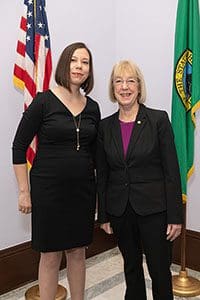Dr. Katherine Bennett had an inside look at the U.S. Senate when she was invited by Sen. Patty Murray to testify before the Committee on Health, Education, Labor and Pensions on Feb. 5. Bennett is a physician at Harborview’s Senior Care Clinic and the founding medical director for UW Medicine’s Project ECHO-Geriatrics program, which is part of the Northwest Geriatrics Workforce Enhancement Center.
Under the leadership of Sen. Lamar Alexander, chairman, and Sen. Murray, ranking member, the committee is holding hearings on ways to improve access to primary care, achieve better health outcomes and reduce unnecessary costs. At this hearing, Bennett was one of four expert witnesses who provided information and answered questions on topics such as direct primary care, telehealth, primary care workforce development and government regulations.
With only eight days to prepare and a four-hour delay on a snowy runway in Seattle, Bennett said that it was quite stressful but also fun. Once she arrived, she was assisted by Sen. Murray’s staff and Sarah Castro, UW director of federal relations. At the hearing, Bennett was impressed with the nice spirit of bipartisanship and camaraderie: “Everyone was enthusiastic … and genuinely interested in solving the big issues.”
As part of her prepared testimony, Bennett explained that the Extension for Community Healthcare Outcomes (ECHO) model was developed by Dr. Sanjeev Arora, a liver disease specialist at the University of New Mexico, in 2003. This innovative telehealth program connects primary care providers with specialists at an academic medical center and uses case-based learning to increase the capacity of primary care clinicians to care for common and complex diseases.

The University of Washington was the first replicator of ECHO outside of New Mexico and now has 10 programs based on this model. Project ECHO-Geriatrics was launched in January 2016 to address the shortage of physicians who specialize in caring for older adults and the issues they face such as dementia, depression, osteoporosis, falls and medication management. The program consists of monthly videoconferences led by a team of geriatrics specialists, including a geriatrician, social worker, psychiatrist, pharmacist, nurse and Area Agency on Aging staff, for physicians in training through the WWAMI Family Medicine Residency Network.
The day after the hearing, Bennett was invited to Sen. Murray’s weekly coffee with constituents. There were about 30 residents from across the state in attendance, including a group of high-school students who are working on substance abuse issues.
After two memorable days, Bennett is hopeful that the Senate committee will advance legislation and authorize increased funding to support Project ECHOs and geriatric programs.
For more information about the Senate hearing, watch the video at How Primary Care Affects Health Care Costs and Outcomes. Dr. Bennett’s prepared testimony begins at 46:40 and continues for five minutes.
See also Project ECHO-Geriatrics for more information about the UW Medicine program.


